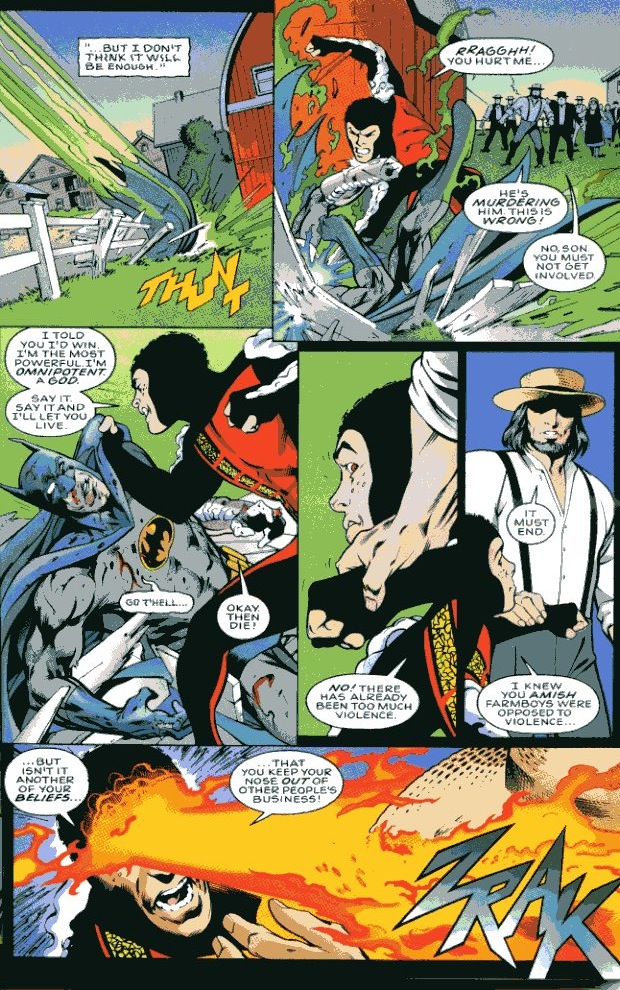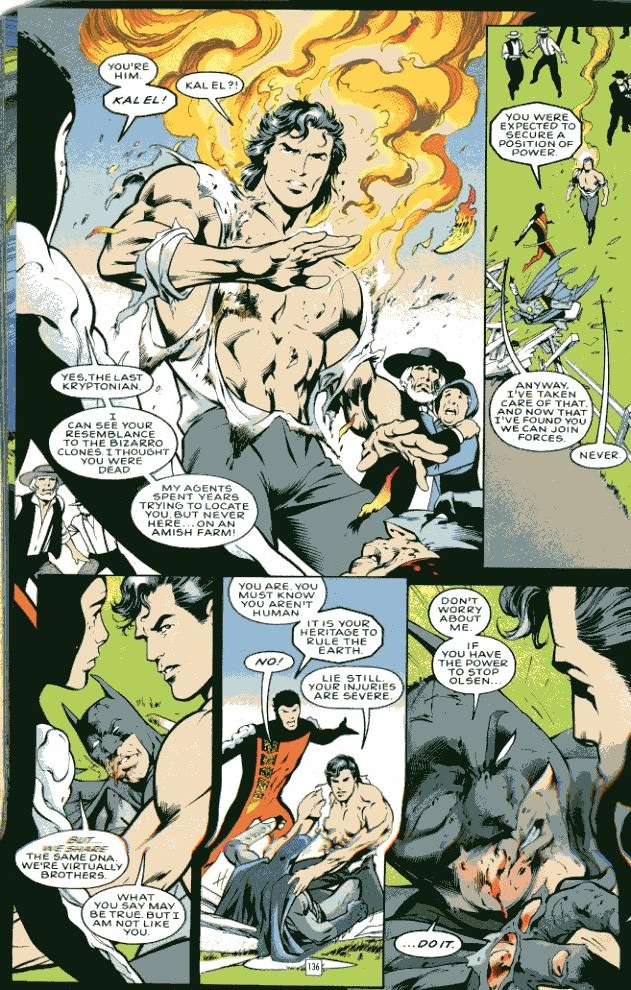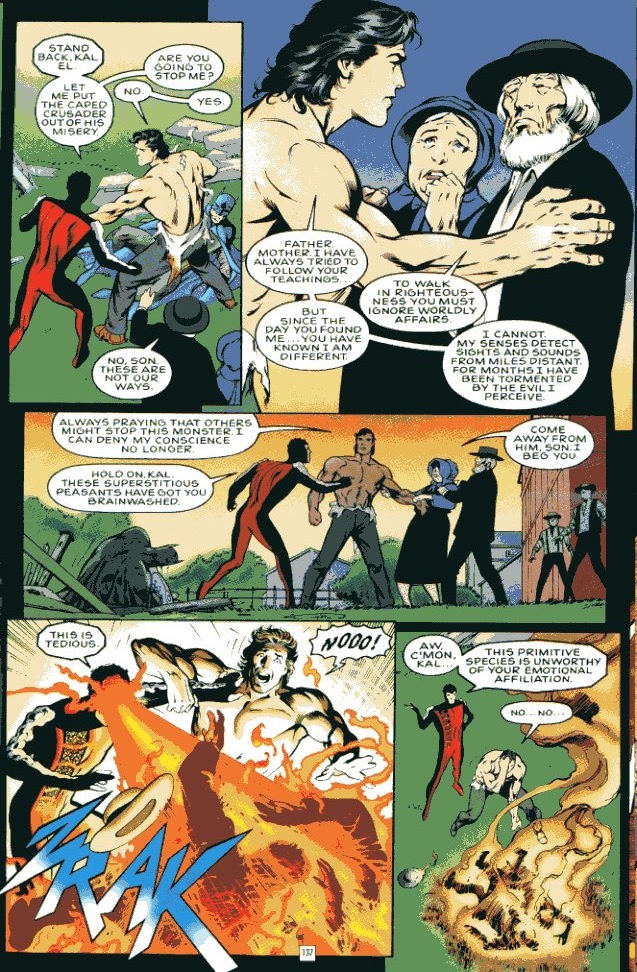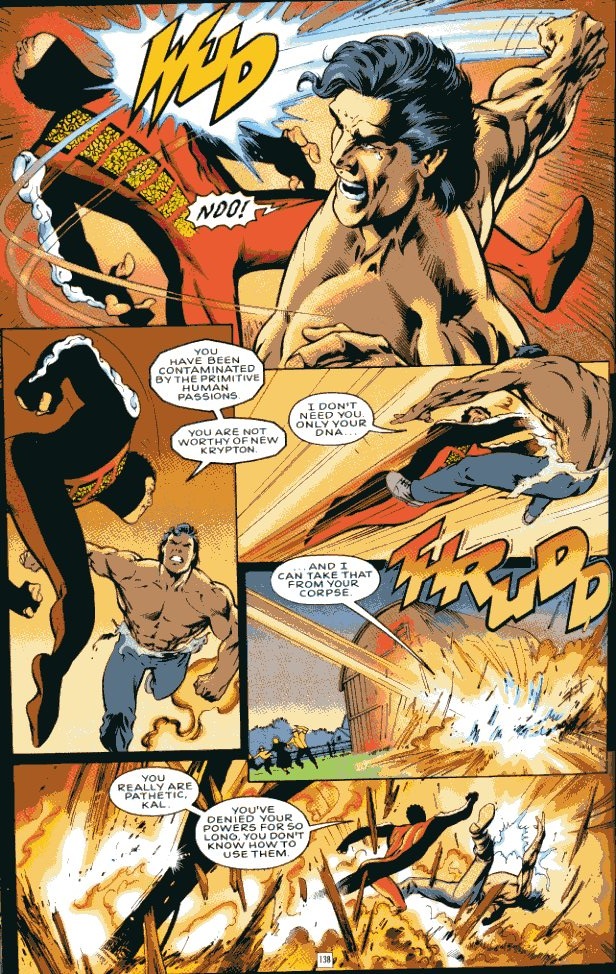I’ve been reading The War of the Lamb, the last book written by John Howard Yoder. Yoder was the most important theologian of pacifism in the last century or so, I think. Appropriately enough for a pacifist theologian, he was a Mennonite.
And, of course, the subject of Mennonite’s made me think again (mostly to my sorrow) of writer and illustrator Alan Davis’ 1998 JLA alternate reality exercise The Nail. For those fortunate enough to have missed the series, it’s high concept is that John and Martha Kent ran over a nail on day that Superman’s rocket ship landed on earth. As a result, the Kent’s didn’t find the ship. Instead (as we learn towards the end of the book) an Amish family found it. Since the Amish won’t interact with the rest of the world and since they are (like most Mennonite sects) pacifist, the fact that this family discovered Supes meant that he never became a superhero; he just stayed on the farm. Without his iconic presence, superheroes (and especially aliens) are distrusted, Lex Luthor becomes mayor, no one is tough enough to stand up to Kryptonian technology…etc., etc. In short, things go to the bad, and it’s all because of the stupid Amish.
Most superhero comics are stupid, and The Nail is no exception. Still, there is something of the idiot savant about it. Davis was looking for a way to neutralize Superman and, by extension, all of superdom. What is the opposite of the superhero? The obvious answer is, a supervillain. Too obvious — and, incidentally, untrue. Superheroes and supervillains are part of the same world, the same milieu. Superman being a supervillain doesn’t remove or negate him; it just puts him front and center in a different role (Earth 3! And god help me that I know that….but anyway….)
So, supervillain is no good. But…what if you make him a pacifist? Then he’s ineffectual, irrelevant — he’s nothing. Which is to say, it’s not supervillainy that’s the opposite of superheroics — it’s pacifism.
The book in its final pages, then, glorifies superheroness not primarily through derring-do, but rather through a thumbnail repudiation of non-violence. This repudiation is sealed by the gratuitous and gruesome obliteration of Superman’s Amish parents, who barely get a panel or two to express their misguided philosophy before Davis reduces them to ash. That’s what you get for keeping Superman down, you religious weirdos!
Yes, that’s Jimmy Olsen as the supervillain. Don’t ask.
Anyway, following this sequence in which Supes sees his (Amish) parents killed, and then attacks the evil Jimmy superOlsen, the Supes and Jimmy battle. Unfortunately, Supes (being Amish and not good at fighting) can’t beat him. Luckily, though, Olsen spontaneously disintegrates because his powers are unstable (again, not worth explaining why.) In the aftermath, Superman decides to become a standard issue superhero, and the implication is that his innate awesomeness will defuse the anti-alien hysteria that has swept the world.
So…parents killed, check; vengeance inflicted, check; dedicate life to superheroics to honor parents, check. Except that, from the point of both the drama and the plot, Superman’s repudiation of nonviolence is completely superfluous, and even, arguably, detrimental. Supes could have just as easily handled Olsen through nonviolent means — getting in his way, or holding on to him. Since Olsen essentially disintegrated on his own, the outcome would have been the same — except that Supes would have actually kept faith with his parents rather than betraying their beliefs for nothing. Similarly, if the world is terrified of malevolent aliens, the sudden revelation of an even more powerful violent alien in their midst seems unlikely to calm things down. On the other hand, had Supes revealed himself to the world as a superpowerful alien who embraced nonviolence and noninterference in the affairs of the world…well, it seems like that might have been a more effective statement.
The logic of the story Davis has constructed, in other word — with Superman as Amish — seems to lead naturally to a parable about the triumph of nonviolence. After all, if the greatest hero in the world is a pacifist, it makes sense that you’d end up with a story in which pacifism is heroic. Unless, of course, you see pacifism and heroism as mutually exclusive, in which case the heroism comes, not from the pacifist witness, but from repudiating your entire past in order to embrace violence in the name of your dead parents who would, undoubtedly, be appalled.
Davis’ story also resonates oddly with broader arguments about pacifism. The usual dig against pacifism is that it is foofy pie-in-the-sky nonsense. As an ideal, it’s all well and good, but in the real world, violence is sometimes necessary. Davis’ story makes this argument by, in part, going out of its way to make the Amish impractical to the point of callousness. Not only do they advocate non-intervention, but they argue that their son shouldn’t help Batman in any way, even though he’s being beaten to death literally on their doorstep. This is surely a bastardization of Amish beliefs; the Amish, after all, can vote; they can interact with outsiders. The depiction here is a caricature, intended to make their position seem ridiculous…and unrealistic.
But the irony is that the world where Superman stays in his Amish community and doesn’t interfere in the outside world is actually more realistic. Because, you know, Superman doesn’t interfere in the world. Because there isn’t a Superman. Nobody has to resort to violence to defeat supervillains, because there aren’t supervillains. The DC Universe is unrealistically violent. The opposite of the superhero is the Amish not just because the superhero is violent and the Amish are not, but because the superhero doesn’t exist, and the Amish do. What happens at the end of The Nail is not an eruption of realism into the Amish fantasy of nonviolence. It’s an eruption of fantasy violence into the Amish’s realistic pacifist community. Perhaps that’s why the Amish parents have to be so summarily dispatched; if they were allowed to stick around, they’re solidity would have made Davis’ entire farrago of nonsense dissolve into mist.
In The War of the Lamb, John Howard Yoder talks a little about heroism, specifically in terms of Martin Luther King and Che Guevara. Both men, he points out, were killed; both have, as a result, been viewed as martyrs. Yoder points out that following King’s assassination:
] Many leaped to the conclusion that nonviolent alternatives had thereby been refuted. At the same time, all over Latin America, the fact that Che Guevera had been gunned down in the Bolivian mountains did not mean that guerrilla violence had failed. Why not?
The inconguity is even more striking when we remember that King…had expected to be martyred. This was true both in the general sense of the knowledge that nonviolence will be costly, undergirded by the Christian readiness to ‘share in the sufferings of Christ’ and in the more precise sense that King gave voice to ominous premonitions in the weeks and days just before his death. Che’s defeat, on the other hand, was not in the Marxist scenario. On the general level, for the Marxist the victory of the revolution is assured by the laws, as sure as those of mechanics of dialectical materialism. In the narrow sense as well, Guevara, just before he was captured and killed, was still expecting to win as head of the violent insurgency in Bolivia.
Is there not some flaw in the logic here? Of a man who predicted his death, who explained why he accepted it, whose work did not perish with his death, the critics argue that his view is refuted by that death. Of the other man, who premised victory and whose campaign did collapse with his death, his faithful proclaim his resurrection…. The Marxist believe that their hero’s death is powerful on some other level than his military defeat. Whatever that reasoning may be called, it is not standard Marxist pragmatism, but some kind of apocalyptic myth.
The Nail suggests that, for “apocalyptic myth,” we might substitute “genre fairy tale.” The narratives that justify violence are, predominantly, not about realism, but about revenge or excitement or masculinity — which is to say, they’re pulp. Perhaps, The Nail suggests, nonviolence isn’t wrong because its unrealistic, but rather because it gets in the way of the really quite embarrassingly stupid stories we like to tell ourselves.
____________________
For more on superheroes and pacifism, here’s my essay about Spider-Dove.




